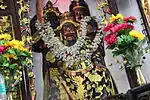Chinese temples in Kolkata
Chinese temples are associations (會館) and sites of worship of Chinese folk religion and Chinese Buddhism for the Chinese community in Kolkata. Kolkata has a significant population of Indian nationals of Chinese ethnic origin (immigrants and their descendants that emigrated from China starting in the late 18th century to work at the Kolkata port as well as the Chennai port). Unofficial estimates puts the population of Indian nationals of Chinese-origin in Kolkata anywhere from 5,000 to 200,000, most of whom live in or near Tangra.[1][2] The Chinese brought with them their culture. At least eight of the Chinese temples are located in the old Chinatown around Tiretta Bazar in Central Kolkata.[3]
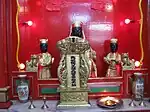
Temples
Though the places of worship are referred to as "churches", they are sites of veneration that adhere to Chinese traditional religion and have nothing to do with Christianity.
- Sea Ip Church (四邑會館)
- Toong On Church (東安會館)
- Choonghee Dong Thien Haue Church
- Gee Hing Church
- Sea Voi Yune Leong Futh Church (會寧會館)
- Nam Soon Church (南順會館)
- Hsuan Tsang Monastery
Gallery
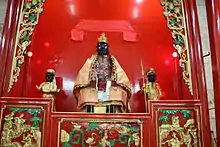
 Religious weaponry and scrolls of the Sea Ip Church
Religious weaponry and scrolls of the Sea Ip Church Religious weaponry and scrolls of the Sea Ip Church
Religious weaponry and scrolls of the Sea Ip Church Kuan Shih Yin enshrined in the Sea Ip Church
Kuan Shih Yin enshrined in the Sea Ip Church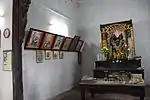 Internal hall of the Toong On Church
Internal hall of the Toong On Church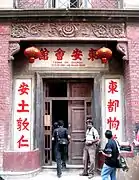 Entrance to the Toong On Church
Entrance to the Toong On Church Entrance to the Sea Ip Church
Entrance to the Sea Ip Church
See also
References
- Ray, Haraprasad (2012). "Chinese, The". In Islam, Sirajul; Jamal, Ahmed A. (eds.). Banglapedia: National Encyclopedia of Bangladesh (Second ed.). Asiatic Society of Bangladesh.
- Biswas, Ranjita (2005). "Little China Stays Alive in Eastern India". IPS News. Inter Press Service News Agency. Archived from the original on 18 February 2006. Retrieved 26 September 2006.
Though most of the local Chinese are Christians, they celebrate the traditional Chinese New Year with gusto and many who emigrated from Kolkata make it a point to return at this time.
- Jaideep, Majumdar (17 January 2012). "A walk to unravel the confluence of cultures in Kolkata". The Times of India. Archived from the original on 6 October 2013. Retrieved 2 April 2013.
